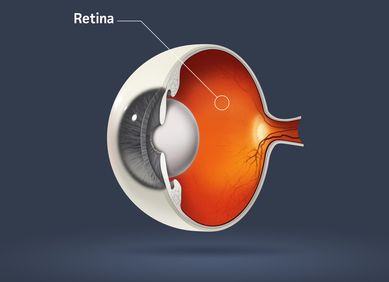Retinal Disease

Our eyes are one of the most important organs in our bodies. While we could perform life functions without them, the loss of vision would substantially impact our daily lives. For this reason, eye diseases can be especially frightening when people think that they could lose their vision.
Retinal disease covers a broad range of conditions that affect the retina. Understanding these diseases can help you recognize when there is a problem sooner so that you can get it treated and protect your vision for life.
The Retina
The retina is the tissue located in the back of your eye that senses light. It then relays the signals to your brain and allows you to process the images you see. If the retina isn’t functioning properly, you wouldn’t be able to read, drive, or see detailed images. When conditions that affect the retina don’t get treated, they can lead to permanent vision impairment and even blindness.
Macular Degeneration
Macular degeneration causes central vision loss and has been related to a person’s age. This condition is commonly found in people who are over 55 years old. Current estimates suggest that there are more than 10 million Americans that suffer from the condition.
As macular degeneration progresses, people often notice that their vision becomes blurry, or that straight lines have the appearance of being bent. As the condition gets worse, it can cause blind spots in portions of your vision.
If you have noticed any of these conditions, call our office today to schedule an appointment with Dr. Michael Ahdoot in Sunnyside, Queens, NY. Fortunately, there are treatment options available to correct macular degeneration. However, if you catch macular degeneration, treatment, and the outcomes are typically better.
Diabetic & Hypertensive Eye Disease
Diabetes and hypertension are conditions that aren’t directly related to your eyes but can have a devastating effect on your vision. Patients who have diabetes and/or high blood pressure are more likely to experience retinal damage. Retinal damage can cause blurry or double vision, floaters, dark spots, flashing lights, rings, or difficulty seeing anything with their peripheral vision. In advanced cases, diabetes can cause permanent blindness. Managing these conditions can help to reduce the possibility of these conditions, but if you notice any changes in your vision, and you have diabetes, schedule an appointment today. There are treatment options, but regular screenings and early intervention is critical in your long-term eye health.
Retinal Detachment
Various conditions can cause the retina to become detached or separated from the eye. Patients who experience retinal detachment may identify floaters in their vision, or bright flashes in the eye. Retinal detachment can occur rapidly and cause permanent vision loss or blindness.
Some of the factors that may lead to an increased risk for retinal detachment include:
Other eye disorders
Injury to the eye
Previous cataract surgeries
Retinal detachment that occurred in the other eye
Major nearsightedness
Genetic factors
Certain medical conditions such as uncontrolled high blood pressure or diabetes
Due to the severe and rapid nature of retinal detachment, it is important to schedule an appointment immediately if you notice changes to your vision. Additionally, if you have any of the listed risk factors, it is important to maintain a healthy eye routine and attend your regular eye exams.
Retinitis Pigmentosa
This disease is a genetic condition that causes vision loss as the rods and cones prematurely die. One of the first symptoms to develop is the inability to see at night. This is often recognized by an inability to drive at night for most patients. This can eventually lead to color blindness. Teens or adolescents are commonly affected by this condition, but because there is a genetic predisposition, it can often be recognized early.
Overview
If you have experienced any changes to your vision, or if you have some of the factors that lead to a higher risk for retinal disease, contact our Sunnyside, Queens, NY office today. Dr. Ahdoot can conduct an examination to see if there are any issues and work with you to identify appropriate treatment to keep your vision sharp.

